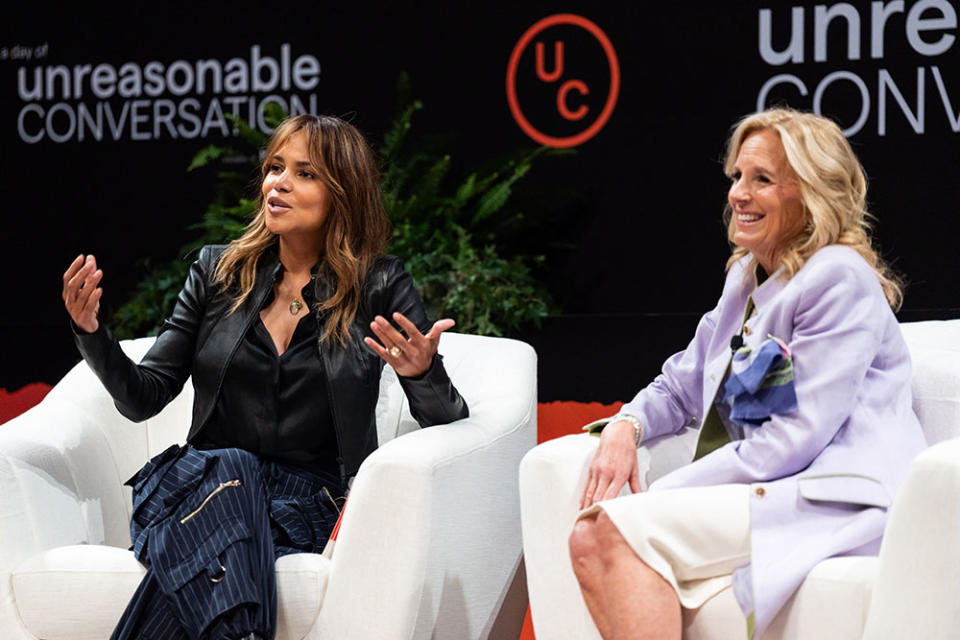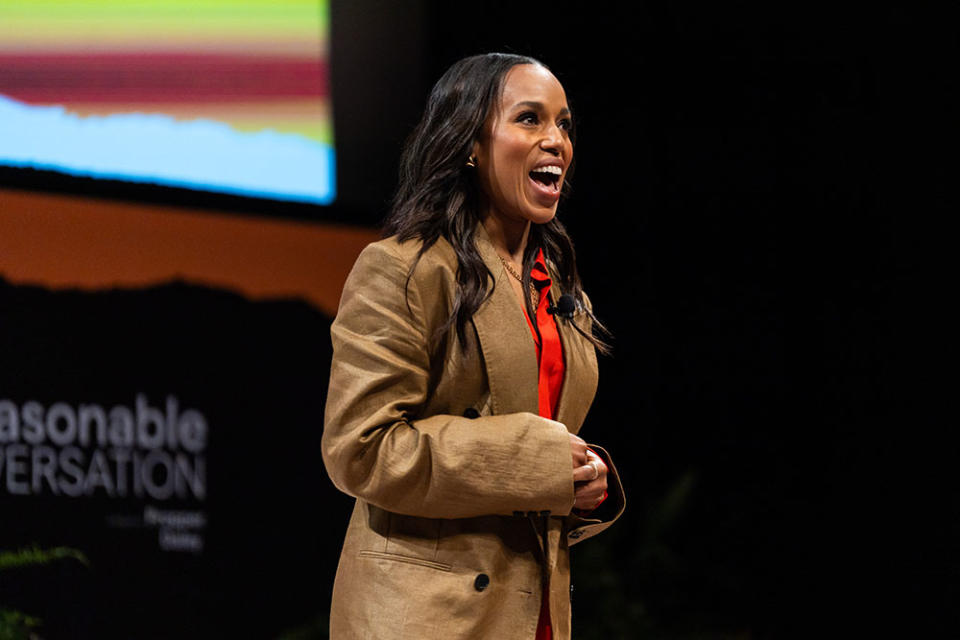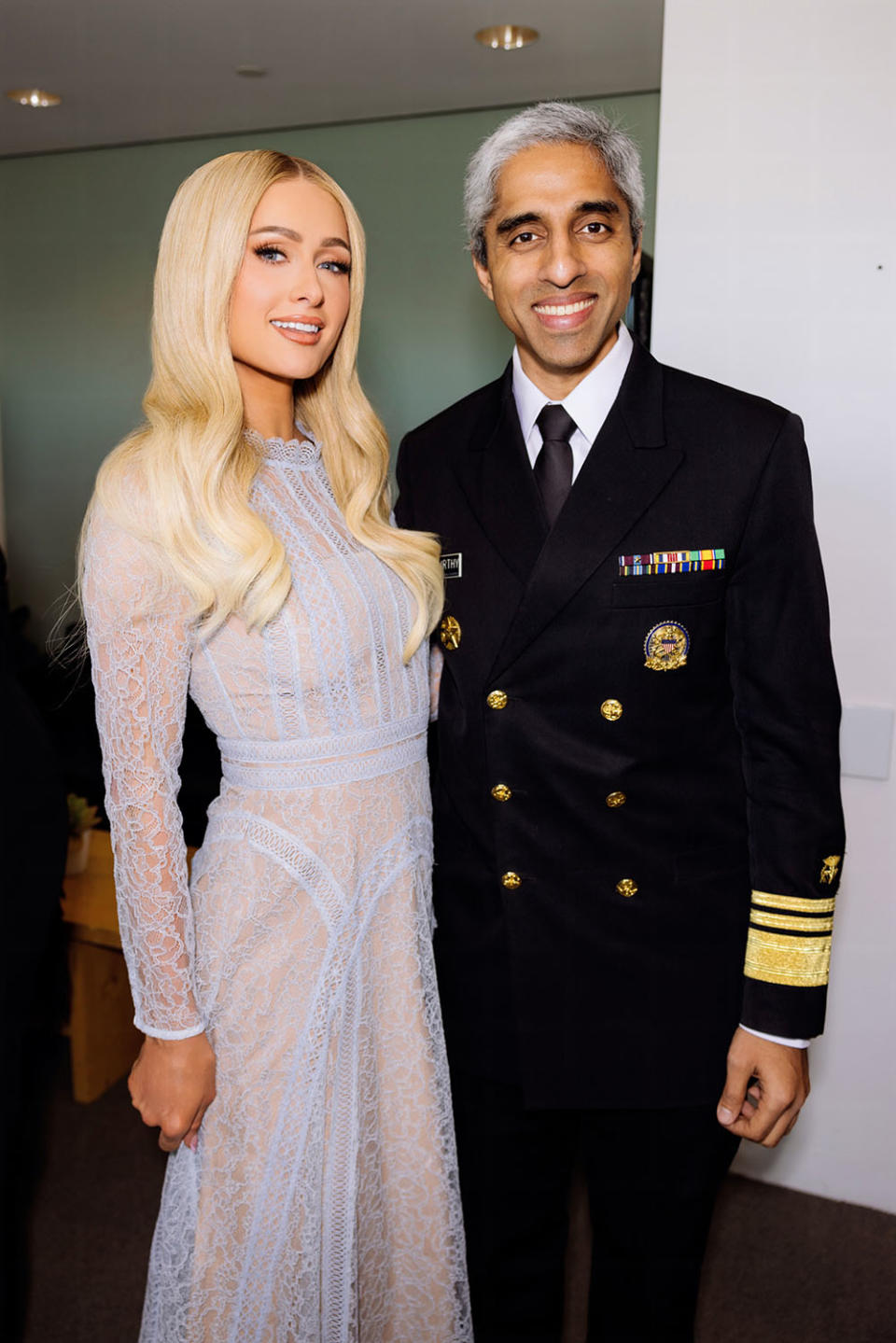Halle Berry Details Herpes Scare That Was Actually Perimenopause in Conversation with First Lady Jill Biden

Social impact agency Propper Daley hosted its fourth A Day of Unreasonable Conversation summit on Monday, featuring a star-studded group of speakers that included Kerry Washington, Halle Berry, Jane Fonda, Paris Hilton, recent Oscar-winner Cord Jefferson and first lady Jill Biden.
The invite-only event — produced in collaboration with culture change agency Invisible Hand, with The Hollywood Reporter as a media partner — took place at the Getty Center with a full day of programming designed to connect TV writers, producers and executives with cultural changemakers. The day’s conversations spanned topics of politics, race, education, climate change, health and labor, with intentions to provide information that will influence future onscreen storylines and help maintain narrative authenticity.
More from The Hollywood Reporter
Elisabeth Moss, Kerry Washington to Star in 'Imperfect Women' for Apple
Jean Smart Says She's "Thrilled" to be Considered a "Gay Icon" at Human Rights Campaign Dinner
Jill Biden's Human Rights Campaign Keynote Address Disrupted by Protesters of Israel-Hamas War
Early on in the day’s schedule, Berry joined the first lady for a conversation about women’s health, menopause and the way older women’s stories are often told; the discussion came after President Biden signed an executive order focused on boosting women’s health research just last week.
Berry, who has become an outspoken menopause awareness advocate in recent years, told the room her aim is about “changing the way women and men feel about women during their midlife and how they feel about this — which used to be a dirty little word — menopause, perimenopause, and we in this room have to change that … it can’t just be the doom and gloom story. This is a glorious time of life.”
The star then surprised Biden by launching into the story of how she found out she was in perimenopause, teasing, “first of all, my ego told me that I was going to skip it — I’m very safe, I’m healthy, I managed to get myself off of insulin and manage my diabetes since I’m 20 years old.” But at 54, she “finally [met] the man of my dreams” in partner Van Hunt, explaining all of the sex they were having as the first lady jumped in, joking, “I didn’t know she was going to tell this story. I’m not talking about mine!”

Berry recalled having extreme pain after sex and going to the doctor, who told her she had the worst case of herpes he’d ever seen. She and Hunt were both tested and neither ended up having herpes, and “I realized after the fact that is a symptom of perimenopause” due to dryness. She continued, “My doctor had no knowledge and didn’t prepare me, that’s when I knew, ‘Oh my gosh, I’ve got to use my platform, I have to use all of who I am and I have to start making a change and a difference for other women.'”
The two ended with a plea to the creators and execs in the crowd to “help us change the way culture views women at this stage of our lives,” Berry said, adding, “and we’re not exactly at the end. We’re sitting up here, two women who are clearly down the path of life, we are not done. We’re just getting started in our next act.”
Washington, whose production company Simpson Street co-chaired the event alongside Showtime/MTV Entertainment Studios, was also among the early speakers, noting the current climate of polarization and difficulty talking to those with different views.
“We all need to be talking to one another outside of our comfort zones, more than ever really, because we’re facing tremendous obstacles, whether it’s the climate crisis, the need for affordable care, wars in Israel, Gaza and Ukraine, an epidemic of loneliness, shattered ideas of what reality and truth are; it’s a lot,” Washington said. “Now some people might say, ‘So you guys think the answer to this is better TV shows?’ And I say yes! I do! I think at least that’s part of it, because we can’t knock on every door in America, but we do have the ability to broadcast and stream directly into people’s living rooms. All across the globe, television allows us to meet people outside of our bubbles; for many people, television is the only way that they meet people who are different from them.”
Washington also took part in a conversation about education with 2023 National Teacher of the Year Rebecka Peterson.

Later in the day, Paris Hilton joined U.S. Surgeon General Vivek Murthy for a conversation on suffering alone, following her revealing the alleged sexual abuse she endured at a boarding school as a teenager in documentary This Is Paris. She has since become an advocate for the “hundreds of thousands of children being sent to the troubled teen industry every year” who are being abused, and has helped change laws in eight states.
“After what I had experienced as a teenager, it was just so traumatizing that when I got out of there, I just said, ‘I never want to think about this ever again,’ and I created this kind of Barbie doll perfect life character,” Hilton explained of how she processed the abuse. “It was something that I didn’t even realize until being an adult now that that was a trauma response to what I had went through, and just being in so much pain and just having such trauma from what I experienced, I created this character where I just didn’t have to think about it. And then I ended up getting on the show The Simple Life, and then I really had to play that character, and the whole world was seeing it … people just assumed that that’s who I really was in real life.”

W. Kamau Bell also moderated a panel on race and diversity with Jefferson, Gloria Calderón Kellett, Jonathan Metzl and Michele Norris, as Bell joked, “We have 30 minutes to end racism.” The group discussed the sense of exhaustion that people have with the diversity conversation, which Kellett said she meets with comedy, as she learned from mentor Norman Lear.
Jefferson, who just two weeks ago won an Oscar for writing American Fiction, mused, “I don’t know that people are tired of the conversation so much as they’re tired of the tenor of the conversation, right? The tenor of the conversation for so long has just been rage and yelling and inability to even listen to another side. And I think that that’s how I feel — I don’t feel tired of talking about race, I feel tired of yelling about race and everybody being so angry about it.
“To me, it makes no sense to agree that racism seeps into people just by osmosis, just by being raised in this country, and then hate everybody who is racist themselves or harbors some prejudice. If you agree that this is a foundational problem in this country, then it’s really hard to write off people who have accepted these things as as doctrine,” he continued. “I’m just ready for the tenor to be different and give people grace, have them give me grace and meet in the middle. I think that’s the only way we can actually start to solve these things.”
The event, which was hosted by Phoebe Robinson, also featured Fonda speaking about the climate crisis, Kesha discussing how she channels her emotions into songwriting, Charli D’Amelio discussing mental health and WGA board member Adam Conover leading a conversation on labor unions.
Best of The Hollywood Reporter

 Yahoo News
Yahoo News 
